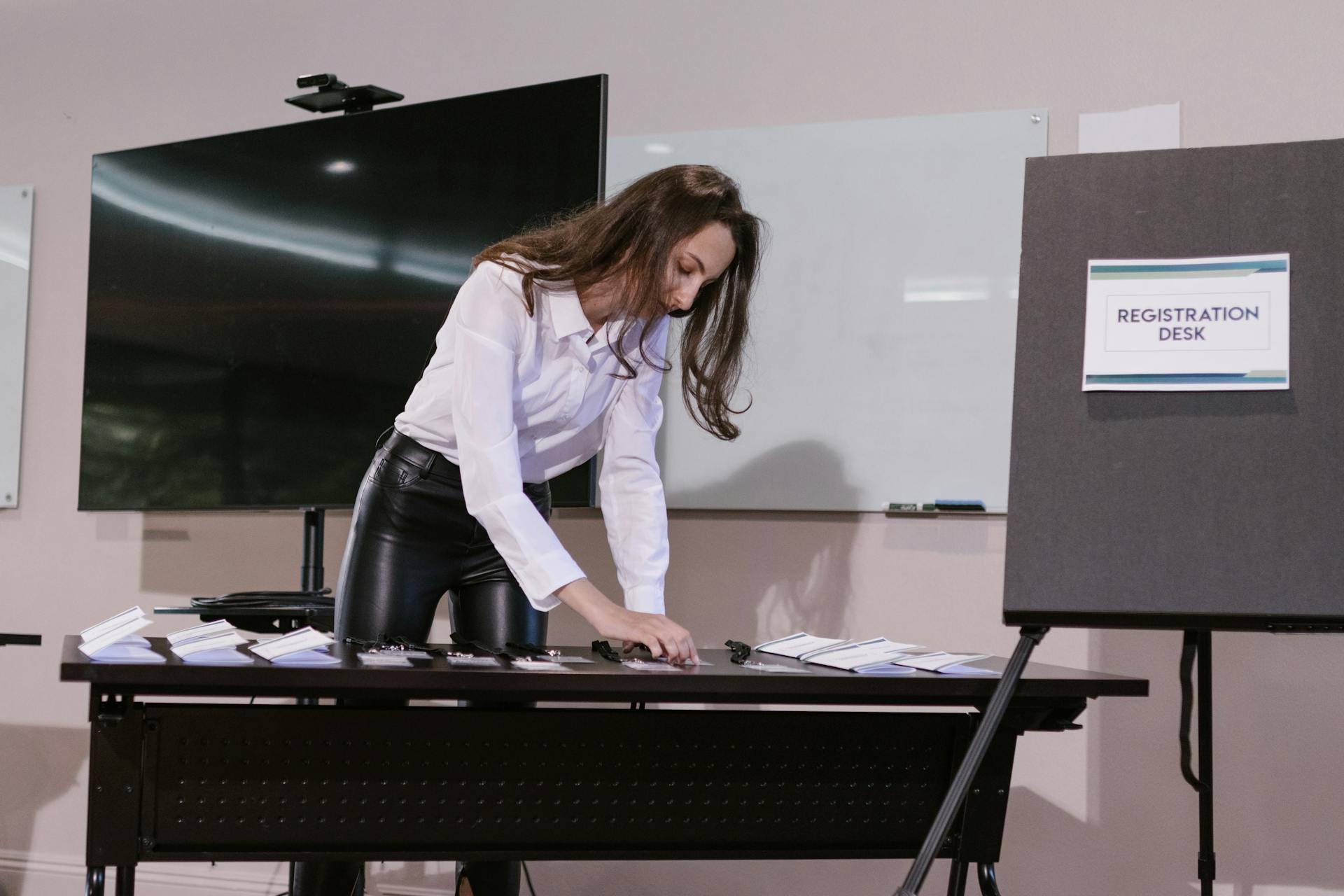
To start a public adjuster business entity in your state, you'll need to register with the state's insurance department. This typically involves filing a license application and paying a fee, which can range from $500 to $2,000.
In most states, public adjusters must also obtain a surety bond, which can cost between $5,000 to $20,000. The bond amount varies by state, so be sure to check with your state's insurance department for specific requirements.
You'll also need to choose a business structure, such as a sole proprietorship, partnership, or corporation. Each has its own advantages and disadvantages, so it's essential to research and understand the implications for your business.
Some states also require public adjusters to have a minimum amount of liability insurance, which can range from $25,000 to $100,000.
Licensing Requirements
To start a public adjuster business entity, you'll need to meet the licensing requirements. These requirements vary depending on the state, but in Indiana, for instance, you'll need to submit a uniform business entity application to the Commissioner with a declaration that the statements made in the application are true and complete to the best knowledge of the individual submitting the application.
The application will require an application fee, which is $50 unless a retaliatory fee applies. You'll also need to provide the name, address, Social Security number, and criminal and administrative history of each individual associated with the business. Additionally, you'll need to designate a licensed individual Public Adjuster to be responsible for the business entity's compliance with Indiana insurance law.
To ensure you meet the licensing requirements, make sure to check the specific regulations for your state, as they may differ. In general, you'll need to have a licensed individual in charge who meets the qualifications, such as being at least 18 years old and a US citizen. You may also need to complete pre-license courses, pass a licensing exam, and have relevant work experience.
In addition to meeting the licensing requirements, you may also need to submit a financial security requirement, such as an Errors and Omissions (E&O) policy or a surety bond. This will provide financial protection for your business and clients in case of errors or omissions.
Entity Licensing Requirements
To obtain a business entity license as an adjuster, you'll need to meet specific requirements. These requirements vary by state, but we'll cover the general steps and details you'll need to know.
First, you'll need to ensure that the licensed individual in charge of your business meets the qualifications for an adjuster business license. This includes being at least 18 years old, operating under the direction of a licensed and qualified owner or manager who is a US citizen, and having the necessary pre-licensing education and work experience.
To apply for an Independent Adjuster license, you'll need to submit a uniform business entity application to the Commissioner with a declaration that the statements made in the application are true and complete. This application will also require an application fee, which varies depending on whether you're a resident or non-resident.
A business entity may apply for an Independent Adjuster license by submitting the following:
- A uniform business entity application to the Commissioner
- An application fee ($40 for residents, $90 for non-residents)
- The name, address, Social Security number, and criminal and administrative history of each individual associated with the business entity
To apply for a Public Adjuster license, you'll need to submit a uniform business entity application with a declaration that the statements made in the application are true and complete. This application will also require an application fee of $50, proof of a $10,000 bond in the business name, and the name, address, Social Security number, and criminal and administrative history of each individual associated with the business entity.

Here's a summary of the fees associated with obtaining a business entity license as an adjuster:
Note that these fees are subject to change and may vary depending on the state where you're applying for a license. Be sure to check with the relevant state authorities for the most up-to-date information.
License Renewal
License Renewal is a crucial step in maintaining your adjuster business license. You'll need to follow specific guidelines and requirements set by your state's Insurance Department or similar licensing authority.
To renew your license, you'll need to submit an application, pay a renewal fee, and meet any continuing education (CE) requirements. Don't forget to keep your license up-to-date to ensure you can perform your job duties legally.
By following the renewal process carefully and submitting all required CE credits, fees, and documentation, you can maintain your license and continue working as an adjuster.
What Is Insurance
Insurance is a financial safety net that helps protect individuals and businesses from unexpected events, such as accidents, natural disasters, or illnesses.

Life insurance provides a financial cushion for loved ones in the event of a policyholder's death, with benefits ranging from $50,000 to $500,000 or more.
Insurance companies operate on a principle of pooling risks, where a large group of people contribute premiums to cover potential losses.
The insurance industry is heavily regulated, with laws and regulations in place to ensure that companies act in the best interests of policyholders.
Types of Insurance
There are three main types of insurance adjusters: Staff Adjusters, Independent Adjusters, and Public Adjusters. Each type of adjuster has a specific role in the claims process.
Staff Adjusters work directly for an insurance company and handle claims on behalf of the company. They may be responsible for evaluating a specific type of claim or handling claims in a specific geographic area.
Independent Adjusters work for independent adjusting firms and are hired by insurance companies to handle claims on their behalf. Independent adjusters may specialize in a particular type of claim, such as property damage or catastrophe claims.

Public Adjusters work on behalf of the policyholder, not the insurance company. They often operate their own businesses as independent contractors or sole proprietors, and may even form limited liability companies (LLCs) or corporations.
Staff and Independent Adjusters are typically hired by insurance companies, while Public Adjusters represent the policyholder. This distinction is important to understand when navigating the licensing requirements for your adjuster business.
Here are the main differences between the three types of adjusters:
Public Adjuster Business
A public adjuster business is a legitimate profession that helps policyholders navigate the claims process after a loss.
Public adjusters are independent professionals who work directly for the policyholder, not the insurance company.
They can be hired to help with any type of insurance claim, from property damage to business interruption.
In most states, public adjusters must be licensed to practice.
The licensing requirements vary by state, but typically involve passing an exam and completing continuing education courses.

Public adjusters can charge a percentage of the claim amount or a flat fee, or a combination of both.
Their fees are usually paid by the policyholder, not the insurance company.
Public adjusters can be beneficial in complex claims or when the policyholder is unsure about their rights under the policy.
They can also help policyholders avoid common pitfalls, such as signing away their rights or accepting lowball offers.
Application and Requirements
To apply for a Public Adjuster license as a business entity, you'll need to submit a uniform business entity application to the Commissioner. This application will require a declaration under penalty of suspension, revocation, or refusal of licensure, that the statements made in the application are true and complete to the best knowledge of the individual submitting the application on behalf of the business entity.
The application fee for a Public Adjuster license is fifty dollars ($50), unless a retaliatory fee applies. You'll also need to provide proof of a $10,000 bond in the business name, specific for Indiana, and not more than six (6) months old.

To be eligible for a Public Adjuster license, the business entity must designate a licensed individual Public Adjuster to be responsible for the business entity's compliance with Indiana insurance law. The business entity must also not have committed any act that is grounds for probation, suspension, revocation or refusal of an independent adjuster license.
Here are the required documents to submit with your application:
- Uniform business entity application
- Application fee of $50
- Proof of $10,000 bond
- Name, address, Social Security number, and criminal and administrative history of each individual involved with the business entity
The Commissioner may require additional documents to verify the information contained in the application. You can submit the application online at either www.sircon.com or through the uniform NAIC paper application.
Responsibilities and Process
As a public adjuster, your primary responsibility is to advocate for policyholders in the event of a disaster or loss, ensuring they receive fair compensation for their damages.
You'll need to navigate the insurance claims process, which typically begins with the policyholder filing a claim with their insurance company.
Your role is to help the policyholder gather necessary documentation and evidence to support their claim.

A public adjuster's services can be retained on a contingency basis, meaning they only receive payment if the claim is successful.
Public adjusters must be licensed and registered in the state where they operate, with requirements varying from state to state.
You'll need to stay up-to-date on industry developments and best practices to provide the best possible service to your clients.
In some cases, public adjusters may work with insurance companies to negotiate settlements, but their primary loyalty is to the policyholder.
Public adjusters often work on a case-by-case basis, each engagement requiring a unique approach and strategy.
Public Adjuster
A public adjuster is a licensed professional who represents policyholders in insurance claims.
They work on behalf of the insured to negotiate with insurance companies and ensure a fair settlement.
Public adjusters are usually hired by policyholders after a disaster or loss, such as a fire or flood.
Their fees are typically a percentage of the settlement amount, which can range from 10% to 50%.

In some states, public adjusters are required to register with the state insurance department.
They must also have a certain level of experience and education to qualify for licensure.
Public adjusters often specialize in specific types of claims, such as property damage or business interruption.
They use their expertise to help policyholders navigate the complex insurance claims process.
Their goal is to maximize the settlement amount and ensure the policyholder receives the compensation they deserve.
Frequently Asked Questions
Can a public adjuster be a contractor?
No, a public adjuster cannot also work as a contractor on-site for a property damage claim, as it's against the law in most jurisdictions. This separation is in place to prevent conflicts of interest and ensure fair representation for policyholders.
Sources
- https://www.in.gov/idoi/licensing/resident-business-entity-adjuster-licensing/business-entity-adjuster-licensing-requirements/
- https://portal.ct.gov/cid/searchable-archive/licensing-producers/public-adjuster
- https://staterequirement.com/insurance-adjuster-licensing/how-to-get-adjuster-business-license/
- https://difi.az.gov/producers/adjuster/adjuster-license-application-business-entity
- https://doi.nv.gov/Licensing/License_Types/Adjuster/Public_Adjuster/
Featured Images: pexels.com

